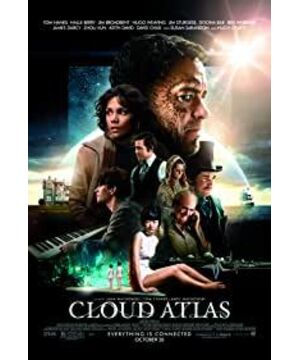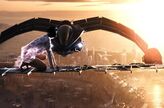What is it that made this ambitious film uncommercially successful? If you have seen it once and only once, then an ordinary viewer can give two words: incomprehensible. Yeah, so incomprehensible. What the movie "Cloud Atlas" does is like the editing of "Decameron" or Kurosawa Akira's "Dream", originally multiple isolated different languages, fairy tales or fables, edited together, trying to give a picture. That's difficult. It's like a strange food on the plate. In people's minds, it is definitely unacceptable: it is a sandwich, steamed bun or bun at the same time.
In the Chinese-speaking world, it is included in the category of brain-burning movies like "Inception". However, there are still differences between the two. The complexity of cloud maps lies in multiple narratives, rather than scientific problems like multiple time and space and dreams. The confusion brought by the cloud map is only formal. One of the charms that montage gives to movies is that through editing and exquisite narration, six full stories are compressed into three hours, and each one of them can be independently supported by a movie. Think about how incredible this is. A similar pioneering work, in the first half of the last century, the film master Griffith once tried in "Party Together Facing Differences" which was also not favored by the audience.
After "Party Facing Differences", multiple narrative montages have occurred in many movies. Those who like "Pulp Fiction" should not be unfamiliar with movie languages such as "Crash" or "The Tower of Babel". This list can be even longer, for example, "The Moment", "21 Grams", "Burning Plains", "Love is a bitch", "Drug Network", "Mother and Child", "True Love First", "The Age of Independence." The original intention and degree of completion of "Cloud Atlas" is about the sum of any two movies in it, or more. Cloud map looks complicated because of its "many". Don't forget that "Cloud Atlas" is an independent film, it is not just self-funded. Before the script was formed, the original novel of the same name was considered a textual work that could not be imaged.
Time and space montage is increasingly being valued by movies, and the sense of strangeness aroused by it has happened in the world of words. In 2012, a Chinese version of a Chilean novel called "2666" came out. 2666 was originally a brilliant novel. Like Yuntu, it lacks the linear relationship between the five parts, but this does not change the fact that it is brilliant. For the five stories in hand, the writer Polano originally dealt with them according to the five medium and long stories. It does not have the ambition of the cloud chart author. But put together, the loose connection suddenly gains strength, unified under one concept: helplessness is eternal, and the world is degenerate.
Multiple narratives are becoming more and more popular, and it seems easier to gain recognition in the world of words. Among the best novels in the new millennium selected by an English-language literary website, "Cloud Picture" and "2666" were highly voted. Whether it is the results of the jury's selection or the results of the readers' selection, the two books are ranked in the top five.
If you split the six stories of Yuntu one by one, then Yuntu is not complicated at all. In other words, the complexity of cloud pictures is easy to simplify, just split a book into six and cut a movie into six. If the cloud map is different from 2666, that is, under the eternal themes of love, life, courage, belief, and resistance, 2666 is more realistic, so it deepens and freezes despair, while the visual cloud map is full of power. At the beginning of 2013, Yuntu conveyed this belief to Chinese audiences: if there is injustice, fight it. If it is something just, then it is not just what it should be, but the behavior itself is full of beauty. The visual cloud image is constantly making jumps and actions, and it also uses montages to solidify the aesthetics of Eastern causal reincarnation.
Is Yuntu a commercial film? An American leftist movie? Is Yuntu deliberately digging on the ideological level? These are not my concerns. Instead, it reminds me of "1984" and "Animal Farm" again. Yuntu uses letters, diaries, music, and reports on these civilized carriers, which are finally transformed into high-quality images, paying tribute to civilization. Yes, in human history, absurdity occurs from time to time, occasionally as thick as smog. At this time, the protesters slightly changed the sky while also spreading clean and crisp aesthetic values. What Yuntu wants to say is that between 1849 and 2346, slavery, the nuclear age, and the future world cannot tolerate even a small amount of unprovoked control. For absurdity, what comes before ridicule is change within one's ability-this is exactly what makes the six stories handled by Yuntu surprisingly consistent.
View more about Cloud Atlas reviews











